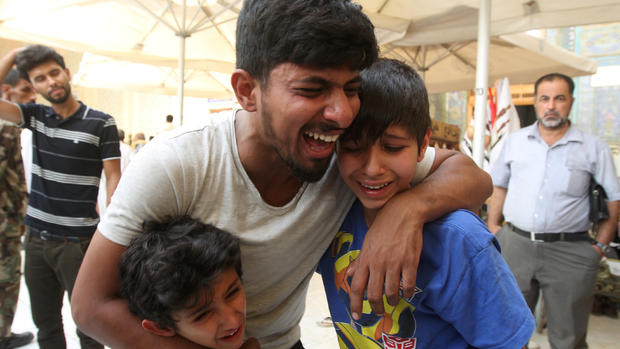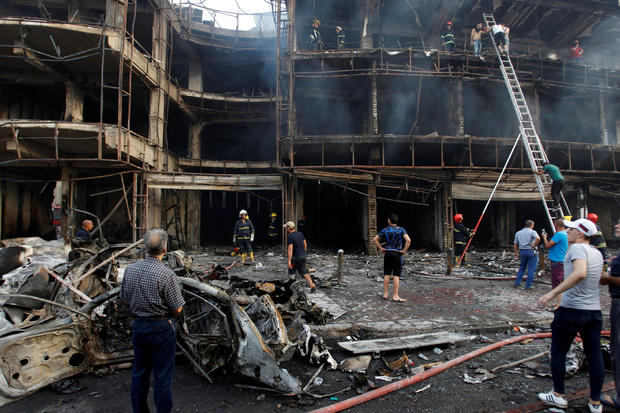ISIS uses mass murder to show it's not beaten yet
BAGHDAD -- A suicide truck bomb in downtown Baghdad killed 167 people and wounded almost 200 more who were out shopping and celebrating early Sunday ahead of the holiday marking the end of Ramadan, security and medical officials said.
The attack, claimed by the Islamic State of Iraq and Syria (ISIS), was the deadliest in months in the Iraqi capital, and came despite a series of recent gains against the extremists, including the capture of Fallujah, which was believed to have been a source of such attacks.
The bomb went off shortly after midnight in a crowded shopping area in the central Karada district, and the dead included at least 15 children, 10 women and six policemen.
Mohammed al-Rubaie, the deputy head of the security committee of the Baghdad Council, said in remarks to Iraqi media on Monday morning that the death toll had reached 167 people, with 180 more wounded. He warned, however, that the figure was likely to rise further due to the number of people who remained in critical condition.
Elsewhere in Baghdad, a roadside bomb went off in the mostly Shiite Shaab neighborhood, killing five people and wounding 16, another police officer said. No group claimed responsibility for that attack, but it, too, bore the hallmarks of ISIS militants.
Karada is a major commercial area lined with clothing and jewelry stores, restaurants and cafes, and was packed with shoppers ahead of Wednesday's Eid al-Fitr holiday marking the end of Ramadan. Most of the victims were inside a multi-story shopping and amusement mall, where dozens burned to death or suffocated, police said.
It was the deadliest attack in Iraq since July 2015 and among the worst single bombings in more than a decade of war and insurgency.
"It was like an earthquake," said Karim Sami, a 35-year-old street vendor. "I wrapped up my goods and was heading home when I saw a fireball with a thunderous bombing," the father of three said.
"I was so scared to go back and started to make phone calls to my friends, but none answered." He said that one of his friends was killed, another was wounded and one was still missing.
As with many previous attacks, ISIS swiftly claimed responsibility for the bombing in a statement posted online, saying it had targeted Shiite Muslims. The Associated Press could not verify the authenticity of the statement, but it was posted on a militant website commonly used by the extremists.
Firefighters and civilians could be seen carrying the dead away, their bodies wrapped in blankets and sheets. Smoke billowed from the shopping center, which was surrounded by the twisted and burned wreckage of cars and market stalls. A group of women were sitting on the pavement, crying for their loved ones.
The Sunni extremists frequently target the country's Shiite majority and Shiite-led security forces, viewing them as apostates deserving of death.
CBS News correspondent Charlie D'Agata reports the bombing came barely a week after the Iraqi military finally cleared nearby Fallujah of remaining ISIS fighters. The city, less than an hour's drive from Baghdad, had been the first Iraqi urban center to fall to ISIS, in January 2014, and was its last major stronghold in the vast, Sunni Anbar province.
D'Agata joined Iraqi special forces during part of the fight for Fallujah, where they faced heavy resistance from militants as they inched closer to the city center, backed by vital U.S. airstrikes.
The Baghdad bombing, notes D'Agata, wasn't just retaliation, but proof that ISIS can continue to strike despite suffering losses -- and not just in Iraq.
The ISIS network has unleashed its brutal brand of terror around the globe. Police in Bangladesh said Monday they had made formal arrests over the ISIS-claimed siege at a café that left 20 hostages dead, over the weekend, including a Miami man.
Turkey, meanwhile, was still reeling Monday from the gun and bomb attack at its main airport that claimed the lives of 45 people last week.
On Sunday, Iraq's Joint Military Operation Command announced that government forces had retaken seven villages south of the ISIS-held city of Mosul as part of a small-scale operation started in March aimed at clearing areas outside the city to cut the supply lines and enable more troops to be deployed ahead of a major operation.
Mosul, Iraq's second-largest city, fell to ISIS when the militants swept across northern and western Iraq in the summer of 2014. It is the largest city in the group's self-styled caliphate.
Hours after the Baghdad bombing, Iraqi Prime Minister Haider al-Abadi and lawmakers visited the blast site. Video footage uploaded to social media showed an angry crowd, with people calling al-Abadi a "thief" and shouting at his convoy. Eyewitnesses said the crowd pelted al-Abadi's car with rocks, shoes and jerry cans.
The prime minister had received a rare boost after the Fallujah campaign following months of anti-government protests over political gridlock, official corruption and poor public services.
He faced renewed criticism in Karada on Sunday over lax security in the capital, where security forces at checkpoints still use bomb-detecting wands that were shown to be useless years ago.
"We are in a state of war, and these places are targeted. The security can't focus on the war (against IS) and forget Baghdad," Sami, the street vendor, said.
The U.N. envoy for Iraq, Jan Kubis, described the Karada attack as "a cowardly and heinous act of unparalleled proportions" and urged the Iraqi government to redouble its security efforts to protect Iraqis during the Eid al-Fitr celebrations.
ISIS militants who "have suffered defeats at the battlefront are seeking to avenge their losses by targeting vulnerable civilians," Kubis added.
The White House also condemned the bombings.
"These attacks only strengthen our resolve to support Iraqi security forces as they continue to take back territory from ISIL, just as we continue to intensify our efforts to root out ISIL's terrorist network and leaders," National Security Council spokesman Ned Price said in a statement, referring to ISIS by an alternative acronym.
At the height of the extremist group's power in 2014, ISIS rendered nearly a third of Iraq out of government control. Now, the militants are estimated to control only 14 percent of Iraqi territory, according to the prime minister's office.
CIA Director John Brennan has said ISIS may find targets away from battlefields in light of the group's recent military losses, the Reuters news agency points out. "To compensate for territorial losses, ISIL (ISIS) will probably rely more on guerrilla tactics, including high-profile attacks outside territory it holds," Brennan told Congress last month.
Reuters says, "Republican critics have faulted President Obama for his administration's handling of the current turmoil in Syria and Iraq, with some calling for a more aggressive approach, with more troops on the ground."
Senate Armed Services Committee Chairman John McCain said Sunday on the CBS News broadcast "Face the Nation that U.S. troops could help beat ISIS. "What we need to do is go to Iraq and kill them," McCain said. "And you can do that with 10,000 of a 100,000 person contingent using American capabilities."

